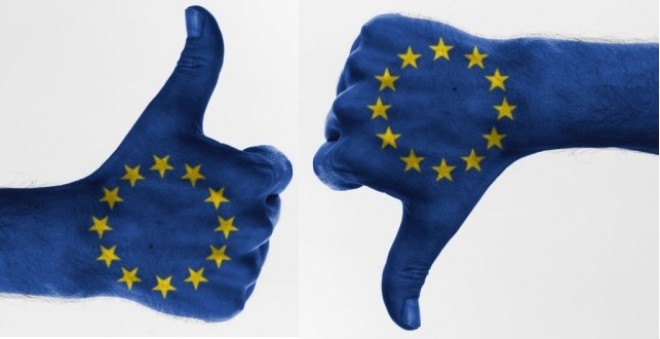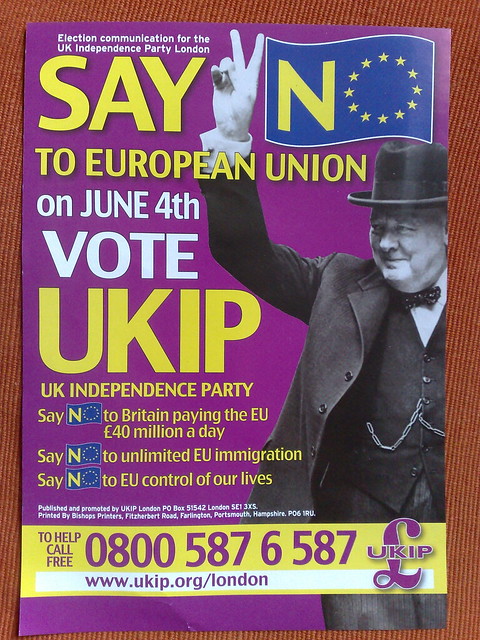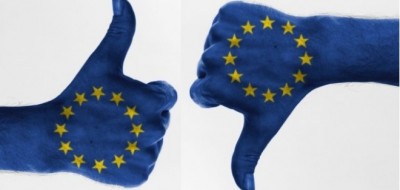In various countries, the EU exit campaign is gaining ground, propelled forward by the enduring European crisis. Over the past months, anti-European demands have clearly surfaced in two of the pillars of the EU: Germany and the United Kingdom.
Europe without Germany? Pros and Cons
On February 6 this year, the eurosceptic liberal-conservative party Alternative for Germany (Alternative für Deutschland) was founded by economists, intellectuals and politicians calling for a return of the Deutsche mark. Leaving the eurozone would be a logical consequence of that return; however it would not necessarily entail leaving the EU. The political party also suggests banning further national bailouts, as well as an end to banks and financial institutions bankrolling national governments.
Furthermore, German entrepreneur Wolfang Reitzle told German weekly Der Spiegel that thanks to an appreciation of the “new” German mark, Germany would benefit from leaving the euro in the long term. It would put Germany in a better competitive position with respect to emerging markets. Reitzle still prefers an option in which Germany stays in the eurozone, but insists all the while that the euro should not be maintained at all costs.
Several media outlets, such as The New York Times, predict that a German exit will draw ever closer if the EU continues bailing out debt-burdened countries. It is estimated that these programmes could end up costing Germany 7% of its GDP. On the other hand, the New York Times and other international newspapers indicate that in case the euro were to collapse, all the euro countries, including Germany, would suffer from debt and inflation problems. The press recommends creating Eurobonds before taking more extreme and painful measures.
Other alternatives have also cropped up, such as the proposal by former European commissioner Frits Bolkenstein to create a separate single currency for all European triple A countries, such as the Netherlands and Finland. Obviously, this would harm the conventional euro.
Goodbye United Kingdom?
Euroscepticism is also flourishing in Great Britain. On May 15th, over 100 Conservative Party MPs voted in favour of an amendment urging that holding an EU exit referendum be made legally binding. They aim to ask the British people the following question: ‘Do you think the United Kingdom should remain a member of the EU?’
The special status of Great Britain in the European Union is being undermined by the consolidation of a party similar to Alternative for Germany, called United Kingdom Independence Party (UKIP). This eurosceptic and nationalist faction is led by Nigel Farage, who reacted to doubts about the viability of the new project after the results of the local elections by saying: “UKIP is here to stay”.
There are of course still many who advocate the United Kingdom’s enduring membership in the European Union. One of them is Thomas de Maizière, who argues that a declining military influence beyond British borders would be cause for concern if the country decides to leave the EU. In Europe, more and more people are tending towards “unionism”, such as Alain Frachon, editorial director of Le Monde, who labels the eurosceptic tide in Britain “fear of the French aspirations for a federal and more homogeneous Europe”. According to Frachon, these will not take shape as long as the United Kingdom and other countries do not give their consent.
It is not clear what to expect if Great Britain and the European Union decide to part ways. On the one hand, pro-Europeans support the idea that a possible exit from the EU would damage British exports, causing its GDP and activities to decrease alarmingly. Furthermore, it would create more obstacles for international trade and people travelling or moving abroad, not to mention the loss of political influence in the Western world.
On the other hand, Eurosceptics predict a rosy future for the British if they decide to leave the union: more opportunities for international trade thanks to bilateral trade agreements, an employment boom, an influx of money which would otherwise have been spent on the EU, increased influence in world politics, more control over migrant flows and increased sovereignty of the British people.
It is beyond doubt that these arguments will be food for thought for British voters. In times of economic crisis, their future decisions may well surprise the world.
Translation of the original article in Spanish by Ellen Vosters
This is a nonprofit explanation










